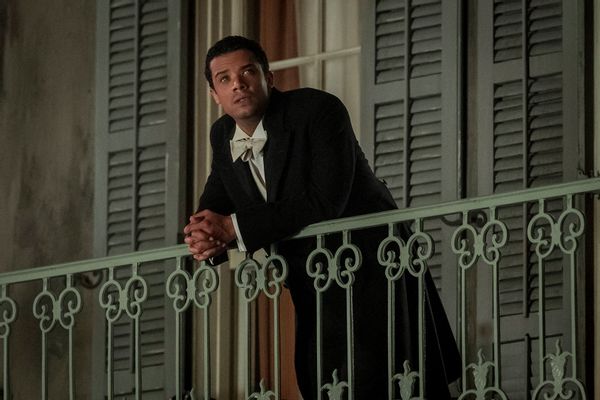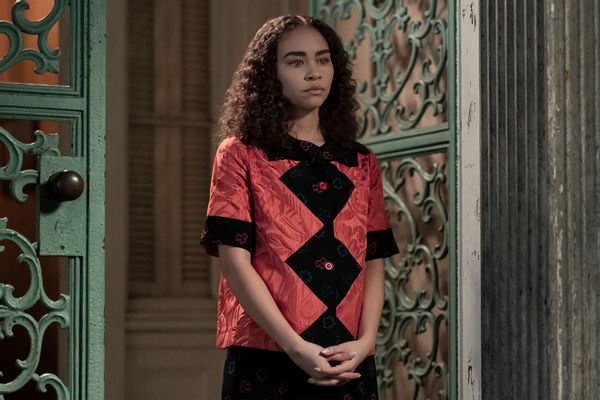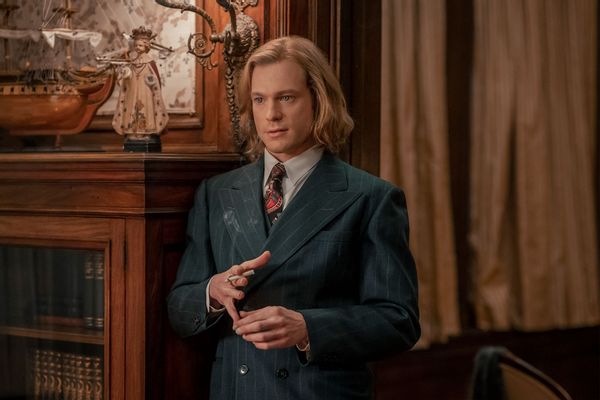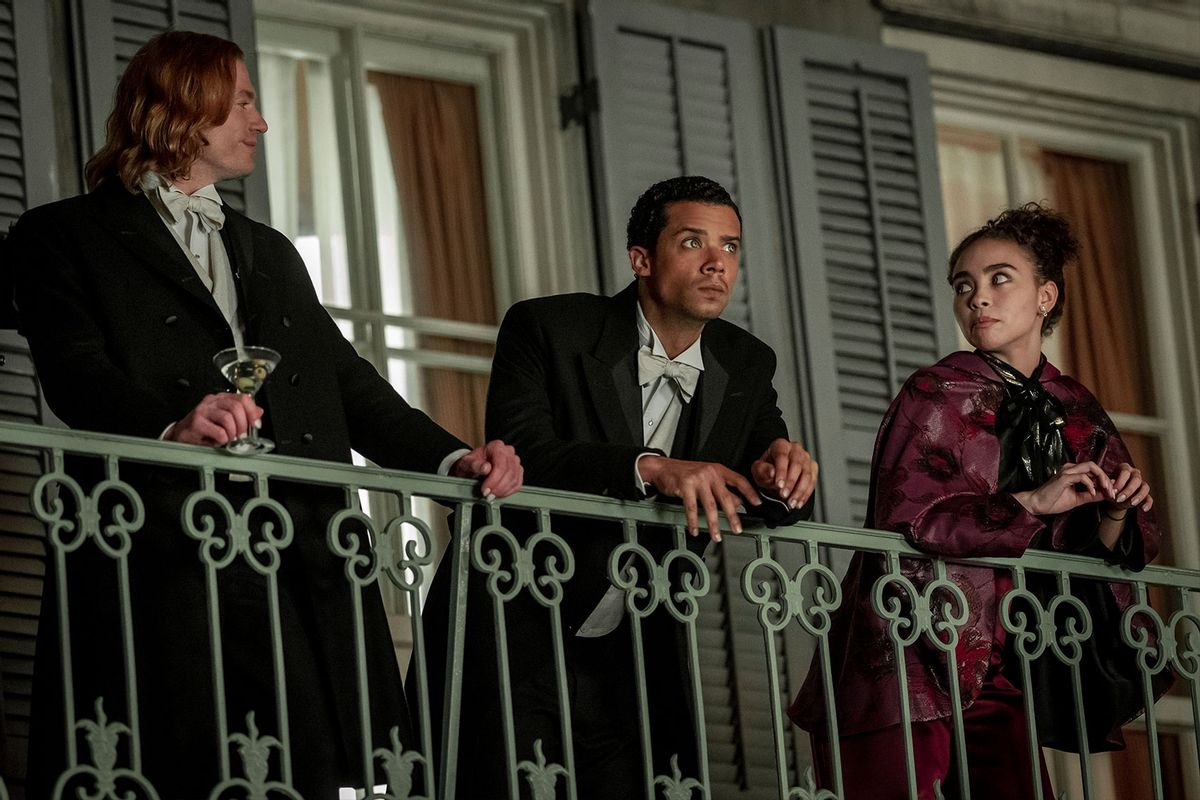Many debates concerning TV adaptations of famous literature eventually come around to whether some of major changes add to the lore or detract from it. Walking that line is tough for showrunners, who are essentially tasked with remaining faithful to the original, beloved plot without committing some small screen equivalent of taxidermy.
A successfully adapted work from existing I.P. should be a vision that is expressly televisual, familiar to fans and yet a work unto itself, able to be enjoyed whether you've consumed the work that inspired or are coming in cold.
There are some works, such as Neil Gaiman's "The Sandman," that use the source material as a storyboard directing elaborate visions to come to life while making a few casting adjustments that honor the spirit without altering from the script. Maybe this is simple fan service. On the other hand, maybe this is also realizing a long-deferred dream fans have had since the comics were first published. Either way, it works.
Then we have AMC's adaptation of "Anne Rice's Interview with the Vampire," an update of a story passed around by teens and tweens a generation or two before "The Twilight Saga" swept the graveyard. Rice's vampires are a reconfiguration in themselves, romantic beings who stride across history like gods, watching human ages rise and fall while remaining steadfastly apart from it.
On the page Louis de Pointe du Lac, the protagonist of "Interview" is haunted by regret, loneliness and ennui. He's also an 18th century white plantation owner in life who, after he was made a vampire, allows his lover Lestat de Lioncourt to feed on the enslaved people forced to work his land. When those people mount an uprising, Louis and Lestat to kill them all and burn the place to the ground to prevent anyone from revealing their existence.
That would not go over well in 2022, reason enough for producer Mark Johnson and showrunner Rolin Jones to transplant Louis and Lestat into early 19th century New Orleans. Choosing to reintroduce Louis as a Black man in the post-Reconstruction era South (played by Jacob Anderson) and having him and Lestat (Sam Reid) live as prominent members of New Orleans society recasts the reader's relationship with the pair and the nature of Louis' psychic turmoil.
 Jacob Anderson as Louis De Point Du Lac in "Interview with the Vampire" (Alfonso Bresciani/AMC)
Jacob Anderson as Louis De Point Du Lac in "Interview with the Vampire" (Alfonso Bresciani/AMC)
He isn't merely tormented by the barbarity of vampirism, which he refuses to indulge as far as that goes. He's tortured by knowing and being reminded time and again that regardless of his supernatural abilities, wealth and the relative privilege and comfort money brings, he is still held in lower regard than Lestat and the white politicians who run the town.
Worse, any financial success he manages to create for himself, his family (which rejects him), and his community can be legislated away by these envious men who set him up to fail.
And when he attempts to send them a message through brute force, creating a gory spectacle out of a corrupt official who richly deserves his demise, the white townspeople response by violently attacking the entire Black community, an assault he can't possibly defend.
There will always be a contingent who moan over TV and film producers' decisions to make white characters Black or assigning them to another non-white culture, using the excuse that filmmakers should portray these figures as the authors originally intended. This didn't work with "The Sandman," since Gaiman had a hand in casting the characters and shaping its episode, slapping down anyone who tried to complain about it.
Arguments against incorporating Black hobbit and dwarves and other people of color into "Lord of the Rings: The Rings of Power" that make the old canon claim are similarly spurious since these races and worlds containing them don't exist and therefore can look any way their adapter pleases.
But the way "Interview" uses Louis' Blackness, and that of their vampire daughter Claudia (Bailey Bass), transforms a familiar and beloved story while remaining true to its roots. That choice makes the universe Rice built less predictable, more heartbreaking and frightening in a completely fresh way. The love between Louis and Lestat is eroticized and defined in clear terms: they are gay men, tolerated to a point because they're rich.
 Bailey Bass as Claudia in "Interview with the Vampire" (Alfonso Bresciani/AMC)
Bailey Bass as Claudia in "Interview with the Vampire" (Alfonso Bresciani/AMC)
However, if loneliness is the novel's major theme, the series trades that to mull the meaning of power. Society sets limits on Louis, but so does Lestat. In the book, Louis paints his maker and partner as an unfeeling monster. The series ups that ante to make him a possessive domestic abuser. Lestat doesn't want to share Louis with anyone, and certainly not another immortal trapped in a 14-year-old girl's body.
But he also uses Claudia to make Louis suffer, reading from pages in her exhaustive diary that let him know that the girl he saved is one he also doomed to being a woman forever trapped in a pubescent body.
It must be said that the producers made one choice with Claudia that was completely unnecessary and lazy, which is to have her survive a sexual assault that occurs while she's run away from her vampire guardians. The writers don't show it, perhaps regarding that as progressive; it's still a reductive, damaging excuse for explaining how a female character becomes tougher and smarter while she's living her part of the collective story separately from the rest of the coven.
Want a daily wrap-up of all the news and commentary Salon has to offer? Subscribe to our morning newsletter, Crash Course.
That also fails to make the most of what makes Rice's "Vampire Chronicles" so compelling. They are competing perspectives of various unreliable narrators, each approaching a shared history with their own agenda.
 Sam Reid as Lestat De Lioncourt in "Interview with the Vampire" (Alfonso Bresciani/AMC)Eric Bogosian's journalist Daniel frequently calls this out throughout the season. (He's another inspired change, albeit an older version of the novel's young journalist, hired by Louis in the sunset of his career to record the vampire's updated and, from his report, more honest version of his life story.) Louis professes his wish that Daniel's work mean something, while Daniel reminds his predator host that once the story published, how the public interprets it will be completely out of their hands.
Sam Reid as Lestat De Lioncourt in "Interview with the Vampire" (Alfonso Bresciani/AMC)Eric Bogosian's journalist Daniel frequently calls this out throughout the season. (He's another inspired change, albeit an older version of the novel's young journalist, hired by Louis in the sunset of his career to record the vampire's updated and, from his report, more honest version of his life story.) Louis professes his wish that Daniel's work mean something, while Daniel reminds his predator host that once the story published, how the public interprets it will be completely out of their hands.
One could easily view that as the producers' rebuttal to malcontents eager to take them to task for making over Rice's characters to believably meet modern times in all of their complexity. The effort to portray an inclusive world is wonderful, of course. But the way it uses its creative shifts from the novel to augment what Rice left her readers makes it especially toothsome and unpredictable, leaving room to live and grow for many seasons. For now, we'll accept the gift of knowing it'll return for a second.
The season finale of "Interview with the Vampire" premieres Sunday at 10 p.m. on AMC. All episodes are currently streaming on AMC+.
Read more
about "Interview with the Vampire"



Shares